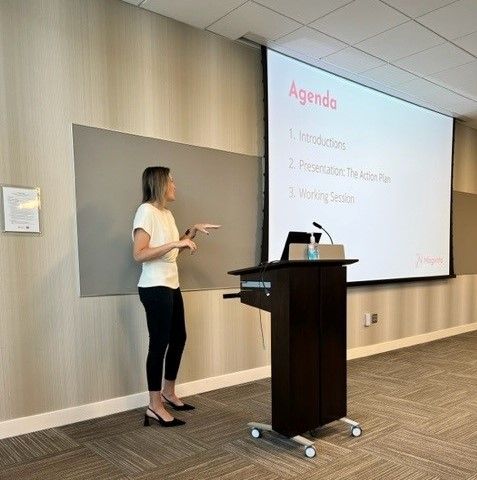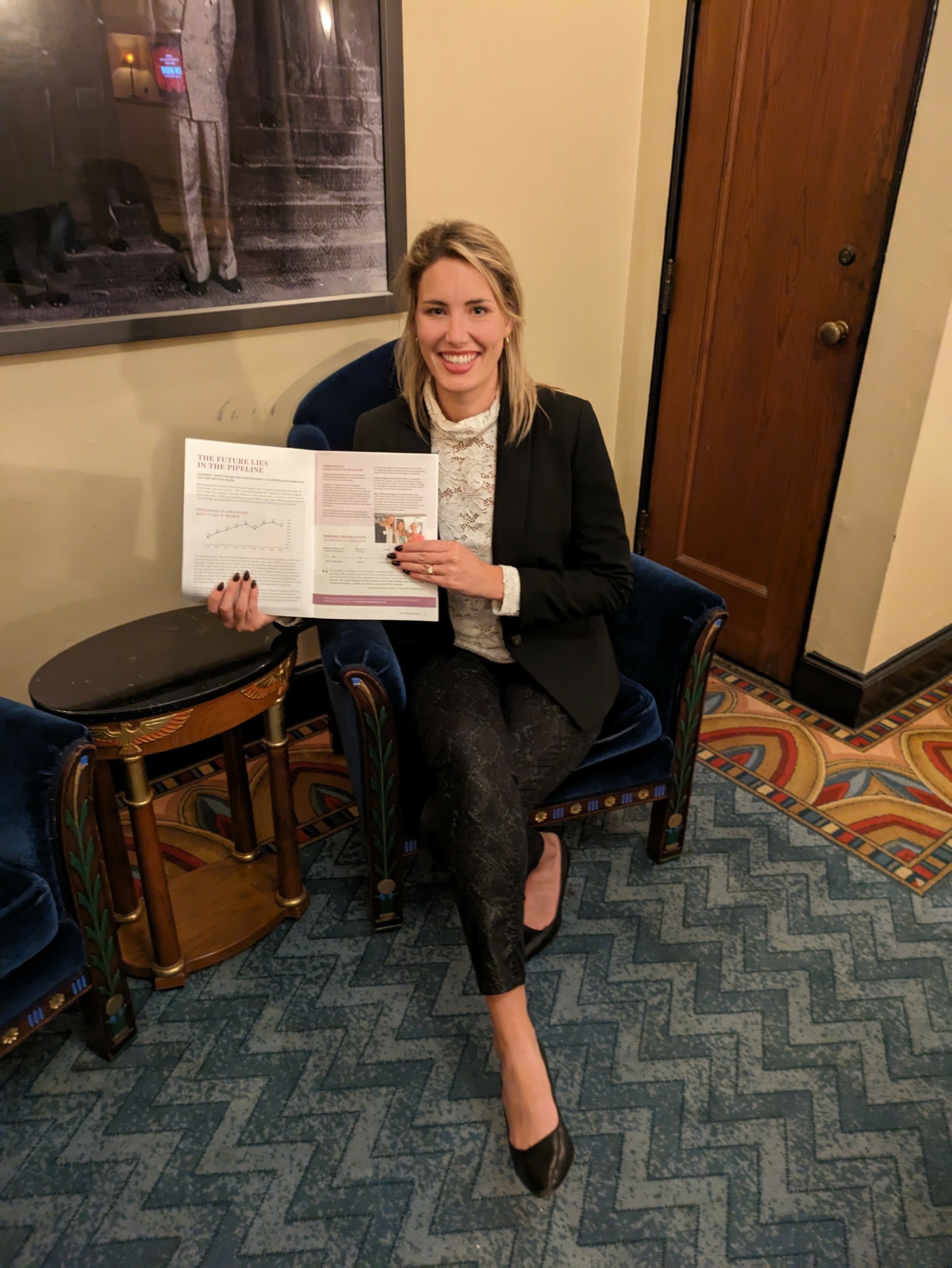We recently connected with Grace Nelson and have shared our conversation below.
Grace, thanks for taking the time to share your stories with us today We’d love to hear from you about what you think Corporate America gets wrong in your industry and why it matters.
Oh boy, I bet this question gets heated! Let me respond from a purely economic standpoint: there are societal gaps between what people need and what’s accessible to them in the corporate marketplace. For example, some people are unable to obtain food, healthcare, or credentials for upward mobility due to access or income barriers. Moreover, there are things folks readily can and do buy, but society at large has decided that it’s nicer if they’re available as a public benefit: education, parks, arts experiences.
Corporations operate with the goal of enhancing their bottom line. Profit is what makes them corporations. There are compelling arguments that the profit-based economic model is what’s “wrong” with Corporate America. I would challenge, though, that it’s not innately “wrong” for corporations to make a profit. The real issue is that the corporate sector isn’t designed to solve every societal problem. Acknowledging the limitations of the corporate sector helps us identify those gaps and create sustainable solutions.
Enter nonprofits: Unlike standard corporations which exist to create profit, nonprofits strive to solve a particular socioeconomic problem unaddressed by Corporate America—or governments, or even philanthropists. We don’t have to compete in the same way businesses do, so we can work together in abundance rather than in the siloes of competition and leverage our resources to create palpable community change. To answer your question, the entire nonprofit industry exists precisely because Corporate America is not equipped to solve the problems we address.
Nonprofits are essential to a thriving society, and with that role comes responsibility. If profit is the universal performance indicator for corporations, impact is that metric for nonprofits. Credibility, accountability, and transparency establish trust in nonprofit efficacy and enable us to continue to meet the needs that would otherwise go unmet. The best thing we can do as nonprofit leaders is ensure every philanthropic dollar is aligned with the outcomes it makes possible. That’s how we maximize our effectiveness and reinforce our place in society.

Awesome – so before we get into the rest of our questions, can you briefly introduce yourself to our readers.
I’ve spent the past ten years in the nonprofit sector—five working within organizations and five as a consultant. Throughout both experiences, I discovered that fundraising is the backbone of any nonprofit, and the key to successful fundraising lies in effective communication. My niche is fundraising communications: helping organizations get their message right to persuade funders to give.
The challenge isn’t usually with executing campaigns; it’s with core messaging. Many nonprofits struggle to clearly communicate their progress toward achieving their mission. For example, are you closer to eliminating homelessness in your community than you were a year ago? How do you know? Without clear answers, donors become disillusioned about the impact of their contributions, and even nonprofit staff can feel discouraged by vague goals and unclear results.
I launched Magenta to solve this problem. We help mission-driven organizations communicate their impact with clarity and confidence. To grow an organization’s impact, it’s critical to define what you’re fundraising for, align resources with funding, and maintain accountability for outcomes. Magenta helps with every step of this process; defining, capturing, and messaging impact. As a result, our clients streamline operations and generate better fundraising results.

Learning and unlearning are both critical parts of growth – can you share a story of a time when you had to unlearn a lesson?
In a recent blog, I wrote about “Five Lessons I’ve Learned in Five Years as an Entrepreneur”—and learning those lessons certainly involved some unlearning, too!
During my tenure in an administrative role in the nonprofit world, I became accustomed to juggling many different tasks and roles. I was rewarded for doing many different things well, so I continued this pattern when I started Magenta, taking on anything tangentially related to fundraising on nonprofit management. During Magenta’s first few years, we were grant writers, strategic planning consultants, social media managers, event coordinators, etc, etc…until I had a million different jobs on top of my “actual job” of running Magenta. I found myself competing with other firms for projects I didn’t even want! Meanwhile, it seemed impossible to find time for the projects I enjoyed working on most. I wrote in my blog: “As I suffered personally from burnout, my business suffered from unclear offerings and mixed messaging.”
So, counterintuitively to the “do everything well” mindset I had adopted early in my career, I realized that I needed to clarify Magenta’s niche and position us as a subject matter expert in that area. Together with my team, I identified Magenta’s most impactful offerings—those services at the intersection of what we do better than anyone and love to execute.
For Magenta, clarifying our unique offerings meant assembling a portfolio that illustrates the work we do best while letting go of work that didn’t support our core message. We honed our offerings from a broad fundraising consulting approach to three deliverables where we add the most value (Impact Strategy, Impact Reports and Cases for Funding) and referred work outside that scope to other trusted partners. It was a tough call to make, but it resulted in a more streamlined approach to our projects, a team uniquely equipped to execute our work, and a message that resonates with clients seeking our unique specialty.
If you want to read the whole blog about the lessons I’ve learned as an entrepreneur, you can check it out here: https://www.magentastrategy.org/posts/five-lessons-from-five-year.

Are there any books, videos, essays or other resources that have significantly impacted your management and entrepreneurial thinking and philosophy?
“The Gap and the Gain” by Dan Sullivan with Dr. Benjamin Hardy taught me to adopt a healthy mindset of pursuing goals while appreciating progress to date. Entrepreneurs frequently fall into an endless treadmill mindset: while seeking continuous improvement and lofty ideals, we become consumed by the day-to-day hustle and fail to look back on the hurdles we’ve overcome. As a result, entrepreneurship can become draining and discouraging. As a result, success becomes a moving target, constantly out of reach. I fell into this trap!
After reading “The Gap and the Gain”, I learned to measure progress using my starting point as an indicator rather than my ending point. The philosophy encourages us to visualize our target for the future while measuring progress against our previous selves. Looking back on how far I’ve come helps me weather setbacks and inspires confidence for approaching the next hurdle. While I’m still pursuing the growth and vision I’ve identified as an “end goal”, I have a healthier appreciation for the journey.
I highly recommend “The Gap and the Gain” for high achievers in any discipline; not just entrepreneurs!
Contact Info:
- Website: https://www.magentastrategy.org
- Instagram: https://www.instagram.com/magentastrategy/
- Linkedin: https://www.linkedin.com/company/67717876/admin/dashboard/

Image Credits
Robby Toles


